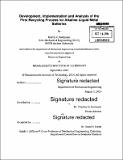| dc.contributor.advisor | Timothy G. Gutowski. | en_US |
| dc.contributor.author | Feldmann, Martin C. (Martin Christopher) | en_US |
| dc.contributor.other | Massachusetts Institute of Technology. Department of Mechanical Engineering. | en_US |
| dc.date.accessioned | 2015-02-05T18:28:32Z | |
| dc.date.available | 2015-02-05T18:28:32Z | |
| dc.date.copyright | 2014 | en_US |
| dc.date.issued | 2014 | en_US |
| dc.identifier.uri | http://hdl.handle.net/1721.1/93844 | |
| dc.description | Thesis: M. Eng., Massachusetts Institute of Technology, Department of Mechanical Engineering, 2014. | en_US |
| dc.description | Cataloged from PDF version of thesis. | en_US |
| dc.description | Includes bibliographical references (pages 166-168). | en_US |
| dc.description.abstract | Increasing energy prices, new environmental laws and geopolitical interests demand for new, more efficient and cheaper grid level energy storage solutions. Grid level energy storage refers to large scale energy storage applications that are connected to the power grid. Ambri Inc. is a MIT startup that develops liquid metal batteries for grid level energy storage. Their liquid metal battery operates at elevated temperatures and uses molten metals as electrodes thereby exhibiting a very low fade rate over hundreds of charging and discharging cycles. Ambri cooperated with MIT to develop a new recycling process for their unique battery chemistry to implement a sustainable end of life management for their product. This thesis describes the process development, implementation and analysis of a hydrometallurgical recycling process for a liquid metal battery. According to jointly developed process requirements, the MIT team build a process that is capable of recycling 5 liquid metal batteries per batch with an estimated processing time of 60 minutes. This will increase Ambri's profit by several hundred thousands of dollars even during the first year of production. The performed analysis of the process investigated safe and stable operating conditions, cost efficiency and scalability. The MIT team concluded that the newly developed recycling process best accommodates for Ambri's current needs and future growth compared to the only competing process, the full cell incineration with following hazardous waste landfill deposition. | en_US |
| dc.description.statementofresponsibility | by Martin C. Feldmann. | en_US |
| dc.format.extent | 168 pages | en_US |
| dc.language.iso | eng | en_US |
| dc.publisher | Massachusetts Institute of Technology | en_US |
| dc.rights | M.I.T. theses are protected by copyright. They may be viewed from this source for any purpose, but reproduction or distribution in any format is prohibited without written permission. See provided URL for inquiries about permission. | en_US |
| dc.rights.uri | http://dspace.mit.edu/handle/1721.1/7582 | en_US |
| dc.subject | Mechanical Engineering. | en_US |
| dc.title | Development, implementation and analysis of the first recycling process for alkaline liquid metal batteries | en_US |
| dc.type | Thesis | en_US |
| dc.description.degree | M. Eng. | en_US |
| dc.contributor.department | Massachusetts Institute of Technology. Department of Mechanical Engineering | |
| dc.identifier.oclc | 900972270 | en_US |
